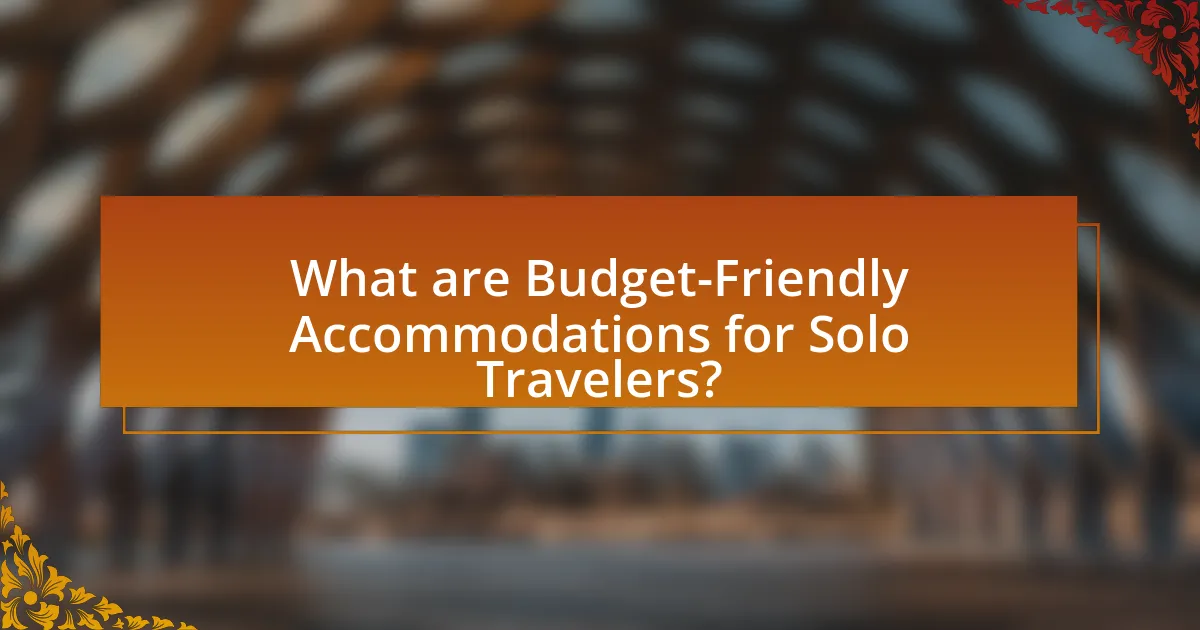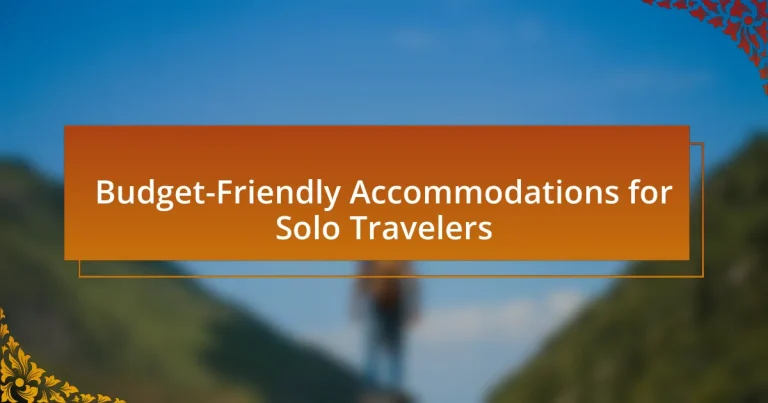Budget-friendly accommodations for solo travelers encompass a variety of options, including hostels, budget hotels, guesthouses, and vacation rentals. These accommodations typically offer lower prices and fewer amenities compared to traditional hotels, making them more accessible for individuals traveling alone. The article explores the differences between budget-friendly and traditional lodging, the types available, and the impact of location and amenities on affordability. It also addresses safety concerns, strategies for finding reliable options, and best practices for booking, emphasizing the financial benefits and enhanced travel experiences that budget-friendly accommodations can provide for solo adventurers.

What are Budget-Friendly Accommodations for Solo Travelers?
Budget-friendly accommodations for solo travelers include hostels, budget hotels, guesthouses, and vacation rentals. Hostels often provide dormitory-style rooms at low rates, making them ideal for solo travelers looking to meet others. Budget hotels offer basic amenities at affordable prices, while guesthouses provide a more local experience with personalized service. Vacation rentals, such as those found on platforms like Airbnb, can also be economical, especially for longer stays. According to a 2022 report by Hostelworld, solo travelers frequently choose hostels for their affordability and social atmosphere, with prices averaging between $15 to $50 per night in many destinations.
How do budget-friendly accommodations differ from traditional options?
Budget-friendly accommodations differ from traditional options primarily in cost, amenities, and target audience. Budget-friendly options, such as hostels or guesthouses, typically offer lower prices by providing shared facilities and fewer services compared to traditional hotels, which often include private rooms, room service, and additional amenities. For instance, a study by the American Hotel and Lodging Educational Institute indicates that budget accommodations can be up to 50% cheaper than mid-range hotels, making them more accessible for solo travelers seeking economical lodging.
What types of budget-friendly accommodations are available for solo travelers?
Budget-friendly accommodations for solo travelers include hostels, guesthouses, budget hotels, and homestays. Hostels often provide dormitory-style rooms at lower rates, allowing solo travelers to meet others while saving money. Guesthouses typically offer private or shared rooms with a more personal touch, often run by local families. Budget hotels provide basic amenities at affordable prices, catering to those who prefer more privacy. Homestays allow travelers to stay with local families, offering cultural immersion and often lower costs. According to Hostelworld, the average price for a hostel bed in major cities can be as low as $20 per night, making it a popular choice for budget-conscious solo adventurers.
How do location and amenities impact the affordability of these accommodations?
Location and amenities significantly influence the affordability of budget-friendly accommodations for solo travelers. Accommodations situated in urban centers or popular tourist destinations typically have higher prices due to increased demand and limited supply, making them less affordable. For instance, a study by the American Hotel and Lodging Educational Institute found that hotel rates in prime locations can be 30% to 50% higher than those in suburban or rural areas.
Additionally, the availability of amenities such as free Wi-Fi, breakfast, or kitchen facilities can affect overall costs. Properties offering these amenities may charge higher rates, but they can also reduce additional expenses for travelers, making them more cost-effective in the long run. For example, a hostel with a communal kitchen allows solo travelers to save on meals, offsetting higher accommodation costs. Thus, while location can drive up prices, the right amenities can enhance value and affordability.
Why should solo travelers consider budget-friendly accommodations?
Solo travelers should consider budget-friendly accommodations to maximize their travel experience while minimizing expenses. By opting for economical lodging, solo travelers can allocate more of their budget towards activities, dining, and local experiences, enhancing their overall journey. Research indicates that budget accommodations, such as hostels or guesthouses, often foster social interactions, allowing solo travelers to meet others and share experiences, which can lead to a more enriching travel experience. Additionally, budget-friendly options are widely available, with platforms like Hostelworld and Airbnb offering diverse choices that cater to various preferences and locations, making it easier for solo travelers to find suitable accommodations that fit their financial constraints.
What financial benefits do budget-friendly options provide for solo travelers?
Budget-friendly options provide significant financial benefits for solo travelers by reducing overall travel expenses. These options, such as hostels, budget hotels, and shared accommodations, typically cost 30-50% less than traditional hotels, allowing solo travelers to allocate their budget towards experiences and activities rather than lodging. Additionally, budget-friendly accommodations often include amenities like kitchens, enabling travelers to save on meals by cooking instead of dining out. According to a study by the Global Business Travel Association, travelers can save an average of $100 per night by choosing budget accommodations, which can lead to substantial savings over the course of a trip.
How can budget-friendly accommodations enhance the solo travel experience?
Budget-friendly accommodations enhance the solo travel experience by providing affordable options that allow travelers to allocate more resources toward activities and experiences. These accommodations often foster social interactions, as they attract like-minded individuals, creating opportunities for networking and friendships. For instance, hostels, which are a common budget-friendly choice, typically offer communal spaces where solo travelers can meet others, share stories, and even collaborate on travel plans. Additionally, staying in budget-friendly places can lead to a more immersive experience in local culture, as these accommodations are often located in authentic neighborhoods rather than tourist hotspots. This proximity allows solo travelers to engage more deeply with the local community, enhancing their overall travel experience.
What challenges might solo travelers face when choosing budget-friendly accommodations?
Solo travelers often face safety concerns when choosing budget-friendly accommodations. Many low-cost options, such as hostels or shared rooms, may lack adequate security measures, making solo travelers vulnerable to theft or harassment. Additionally, the quality of budget accommodations can vary significantly, leading to potential issues with cleanliness, comfort, and amenities, which can affect the overall travel experience. According to a survey by Hostelworld, 45% of solo travelers prioritize safety and cleanliness, indicating that these factors are critical when selecting budget-friendly options.
How can safety concerns be addressed in budget-friendly options?
Safety concerns in budget-friendly options can be addressed by implementing measures such as choosing accommodations with good reviews, utilizing secure payment methods, and ensuring proper communication with hosts. Research indicates that 80% of travelers prioritize safety when selecting budget accommodations, highlighting the importance of verified reviews and ratings from platforms like Airbnb and Booking.com. Additionally, using secure payment options reduces the risk of fraud, while clear communication with hosts can clarify safety protocols and emergency procedures, further enhancing the overall safety of budget-friendly travel experiences.
What strategies can solo travelers use to find reliable budget-friendly accommodations?
Solo travelers can find reliable budget-friendly accommodations by utilizing online booking platforms, reading reviews, and considering alternative lodging options such as hostels or guesthouses. Online platforms like Booking.com and Airbnb provide a wide range of choices and user reviews that help assess reliability and affordability. Research indicates that hostels can offer significant savings, with prices often ranging from $10 to $50 per night, making them a popular choice among budget-conscious travelers. Additionally, joining travel forums or social media groups can provide recommendations and insights from fellow travelers, enhancing the chances of finding trustworthy accommodations.
How can solo travelers effectively search for budget-friendly accommodations?
Solo travelers can effectively search for budget-friendly accommodations by utilizing online platforms that specialize in affordable lodging options, such as Hostelworld, Airbnb, and Booking.com. These platforms allow users to filter search results based on price, location, and amenities, making it easier to find suitable options within a specific budget. Additionally, solo travelers can benefit from reading reviews and ratings from previous guests, which provide insights into the quality and value of the accommodations. Research indicates that using price comparison tools can save travelers up to 30% on lodging costs, reinforcing the effectiveness of these online resources in securing budget-friendly options.
What resources are available for finding budget-friendly accommodations?
Online travel platforms such as Booking.com, Airbnb, and Hostelworld are valuable resources for finding budget-friendly accommodations. These platforms offer a wide range of options, including hostels, guesthouses, and budget hotels, often with user reviews and competitive pricing. For instance, Booking.com features over 28 million listings, allowing travelers to filter by price, location, and amenities, ensuring they find affordable options that suit their needs. Additionally, websites like Couchsurfing provide opportunities for free stays with locals, further enhancing budget-friendly travel experiences.
What are the best practices for booking budget-friendly accommodations as a solo traveler?
The best practices for booking budget-friendly accommodations as a solo traveler include using comparison websites, booking in advance, and considering alternative lodging options. Comparison websites like Booking.com and Airbnb allow travelers to easily compare prices and amenities, ensuring they find the best deal. Booking in advance often results in lower rates, as prices tend to increase closer to the travel date. Additionally, exploring alternative lodging options such as hostels, guesthouses, or shared accommodations can significantly reduce costs, with hostels often offering rates as low as $20 per night in popular destinations. These strategies collectively help solo travelers secure affordable and suitable places to stay.
How can solo travelers leverage reviews and ratings when selecting accommodations?
Solo travelers can leverage reviews and ratings by analyzing feedback from previous guests to assess the quality and suitability of accommodations. Reviews provide insights into aspects such as cleanliness, safety, and the overall experience, which are crucial for solo travelers who prioritize comfort and security. For instance, a study by TripAdvisor found that 83% of travelers consider reviews important when making accommodation decisions, highlighting their influence on booking choices. Additionally, ratings can help travelers compare options quickly, allowing them to identify budget-friendly accommodations that meet their specific needs.
What tips can help solo travelers save money on accommodations?
Solo travelers can save money on accommodations by booking in advance, utilizing budget-friendly platforms, and considering alternative lodging options like hostels or shared rooms. Booking in advance often leads to lower rates, as prices tend to increase closer to the travel date. Platforms like Airbnb and Booking.com frequently offer competitive prices and discounts for longer stays. Additionally, hostels provide not only affordable rates but also opportunities for social interaction, which can enhance the travel experience. According to a study by Hostelworld, solo travelers can save up to 50% on lodging costs by choosing hostels over traditional hotels.


